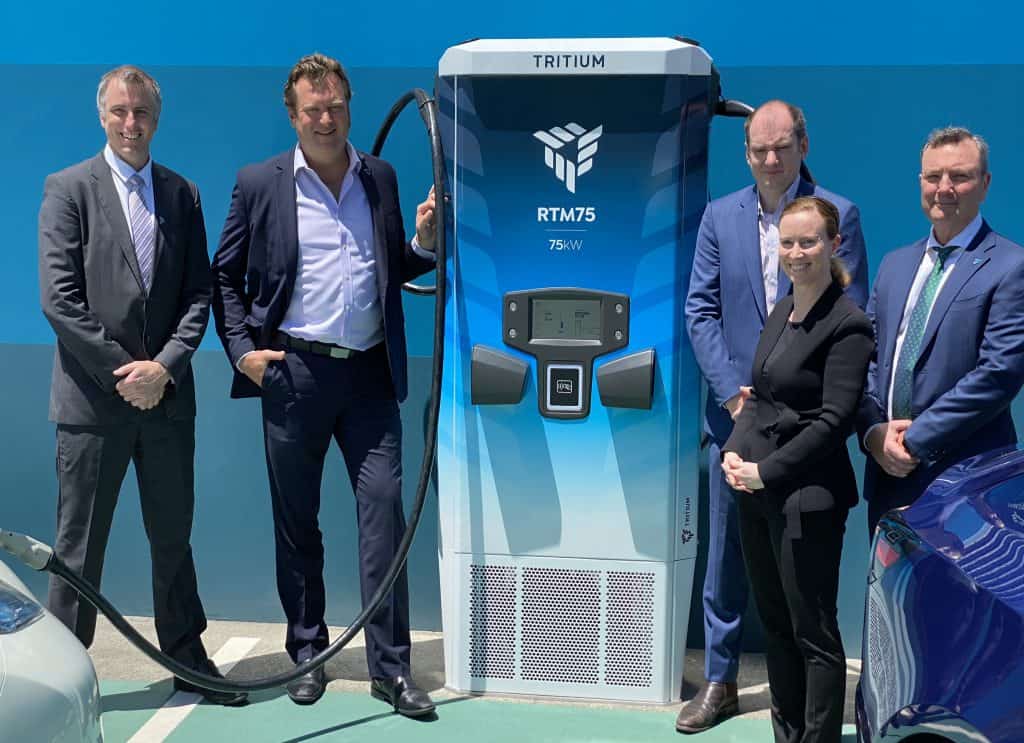
Tritium, a global leader in DC fast charging technology for electric vehicles (EVs), has unveiled the first platform to enable truly scalable electric vehicle charging networks anywhere in the world, with the launch of its MSC hardware platform.
The Modular Scalable Charging (MSC) hardware platform provides customers with the flexibility to increase the power level of their charger as EV charging capabilities advance, and “pay as you grow”. Charger power can be increased in 25kW increments, starting at 25kW and increasing to 350kW and beyond.
As part of the launch, the company also revealed the first charger built on the platform with the unveiling of its next-gen RTM75 DC fast charger, allowing drivers to add 75 km (46 mi) of range to an electric vehicle in 10 minutes of charging.
“This has been something the industry and our customers have asked for over the years, and we are the first company in the world to deliver it,” said Jane Hunter, CEO of Tritium. “With our MSC platform, 50kW DC chargers can quickly be upgraded to 75kW, 100kW, and beyond, without a rip-and-replace required.”
“This solution is future-proofing charging infrastructure all around the globe, something customers have been challenging the industry to deliver. No longer is a charger just a charger; instead, it’s the critical first step to meet the needs of both today’s and tomorrow’s electric vehicles.”
MSC Hardware Platform to Transform EV Charger Networks with True Future-Proof Capability
Previously, network operators were required to install chargers from a set of prefabricated charging options; often set at 50kW, 175kW, or 350kW.
However, the MSC hardware platform allows for the quick installation of additional 25kW rectifiers within each MSC-supported charger, such as the RTM75 and future iterations of Tritium chargers. Charger operators can purchase an RTM75 charger but start at 25kW or 50kW, pending their current power requirements, and scale to 75kW as their charging needs increase.
“The MSC hardware platform provides the next level of capital efficiency and scalability while still providing all the great attributes Tritium’s products have become known for: design, slimness, and low maintenance,” said Dr David Finn, Chief Growth Officer and Founder, Tritium. “The electrification of transportation is at tipping point, so our customers want to know how they can easily extend their charging site capacity over the coming years. They want no regrets and capital efficient scaling of their charging sites. Tritium’s MSC hardware platform allows our customers to scale their charging sites for half the price and configure their charging sites for a desired reliability.”
“The MSC platform will allow Tritium to rapidly deploy new product and our aim is to provide at least one new product every quarter to address the needs of customers servicing the home/workplace, public, fleet depot, segments. The first product on the MSC hardware platform is the RTM75, with the PKM150 and PKM350 following in 2021.”
The RTM75: Built for workplace, public, and fleet depot charging applications.
To meet the demands of public charging infrastructure, Tritium collaborated with their customers to develop a scalable solution for retail, urban, and public environments where easy-access charging infrastructure is most prominent.
The RTM75 facilitates simultaneous charging for two EVs at a time and supports all charging standards on the market, including CCS and CHAdeMO, and satisfies the needs of all batteries up to 920V.
Further, the RTM75 is equipped with Plug and Charge (ISO 15118) technology, eliminating credit card payments or RFID authentication at the charger. Instead customers can pay through the charging cable when it communicates to the car directly; a driver simply plugs in their EV, charges their car, and drives away knowing that payment was automatically and securely managed.
With the sealed electronics enclosure and legendary small footprint for which Tritium is renowned, the RTM75 can be installed in spaces where other chargers simply cannot fit. The fully sealed enclosure significantly reduces wear and tear, decreasing the need for maintenance, and prolonging the life of the charger. This next-gen IP65 fully-sealed fast charger can withstand the elements from -35°C to +50°C (-31°F to +122°F), while keeping electronics free from dust, water, salt, or other contaminants.
About Tritium
Founded in 2001 by e-mobility pioneers, Tritium designs and manufactures proprietary technology to create the world’s most advanced and reliable DC fast chargers for electric vehicles.